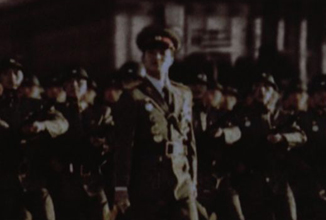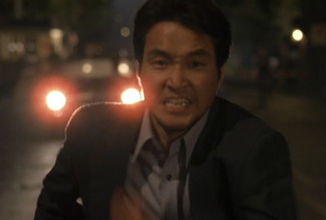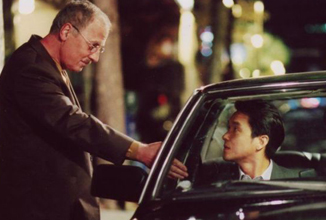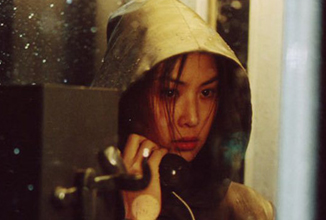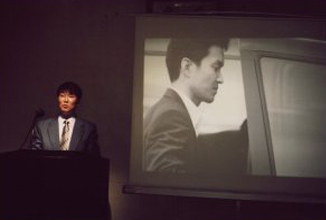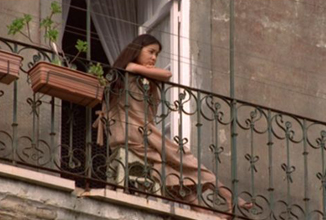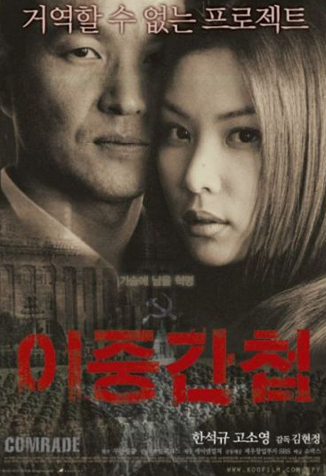"If my country wants me to die, then I will die!"
Synopsis:
Byung-ho (Han Suk-kyu) is a North Korean who has been a government agent in East Berlin for a number of years. However, in 1980 he crosses Checkpoint Charlie attempting to defect to South Korea with North Korean operatives hot on his trail. Barely escaping, Byung-ho is rescued by South Korean Intelligence but is almost immediately taken and repeatedly tortured to ascertain if his allegiances really have changed. No matter what brutality he is subjected to, Byung-ho continues to cry ferociously for South Korea's freedom and as the South's trust in him gradually grows he is enlisted as a South Korean agent. Nonetheless, the question still remains; are his loyalties now truly with the South or is he nothing more than an undercover infiltrator still working for the North?...
Review:
While Double Agent (aka Comrade) initially appears to be a straightforward thriller based on the question of whether or not Byung-ho is still loyal to North Korea, before long it becomes clear that the film has a rather more involved agenda, and, to that end, Byung-ho's true allegiance is revealed fairly early on in proceedings (hence me having few qualms about detailing that fact in the above synopsis), with knowledge of the true state of play being not just necessary but, in fact, vital to the underlying ideas within Double Agent's narrative:
Byung-ho is resolute in his belief that he is fighting for the right side; is utterly committed to his cause and prepared to do whatever is necessary, without question, to ensure that the "Glorious North" (as he sees it) prevails. Ignoring his own needs for what he believes is the greater good, he takes no pleasure in capitalist trappings or comforts, utterly focused, as he is, on his orders to outwardly appear to be helping the South while, all the while, undermining their every move.
However, the one thing he cannot throw aside is his growing love for Yun-mi (Ko So-young), the female North Korean operative who is his contact with the North, and though he is fully willing to sacrifice himself ("If my country wants me to die, then I will die!"), it is only when his orders involve hurting those he cares about that he finally begins to question what is being asked of him. At that stage, his true place in proceedings becomes blatantly clear (initially believing himself to be a important member of his cause, he ultimately learns that he is merely a cog in the machine), and with neither side providing any chance of a get out clause, he finally realises that his only option is to escape both, becoming an enemy of not just one state but two.
Double Agent takes the idea of "Ask not what your country can do for you, but what you can do for your country" and deftly shows what can ultimately happen when the desires of the many come into direct conflict with the needs of the one - when demands made of the head oppose the true feelings of the heart.
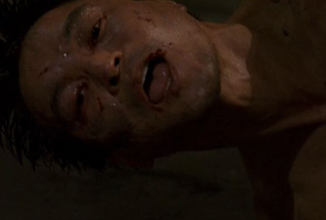 |
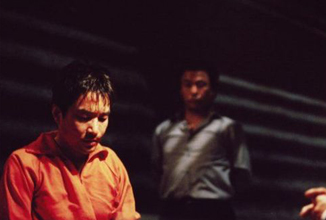 |
Double Agent has much more in common with older, classic spy thrillers (not least from the West) than with the pyrotechnics laden action fests that have become increasingly popular of late, and while this may be partly due to its age, it's also obvious that the film is attempting to be an altogether deeper affair - a character study of a dark and serious tone, rather than a pulse-pounding (and altogether throwaway) story of the glamorous exploits of a secret agent on a near impossible mission. There are no explosions, no near-acrobatic stunts and no cutting edge gadgets whatsoever in Double Agent, the storyline instead focusing on the changing place, fortunes and love of a man embroiled in a life or death game of political chess - a man who believes himself to be a knight but is, in reality, nothing more than a pawn.
As such, Double Agent has a added level of realism present, on top of that created by the basing of the narrative on the still ongoing tensions between North and South Korea, but while this approach is certainly to be commended, there are nonetheless several scenes where Byung-ho's endeavors feel rather less than life or death (even though they clearly are within the context of the narrative itself) - for example: naval and military 'missions' taking place on the front line (if you will) with Byung-ho monitoring their progress from Intelligence Headquarters; or instances of him interrogating a student, suspected of being a North Korean spy, which simply consist of the two men having a question and answer session across a table in an interrogation room - and though these do ultimately add to the overall story arc, they do tend to slow proceedings down somewhat.
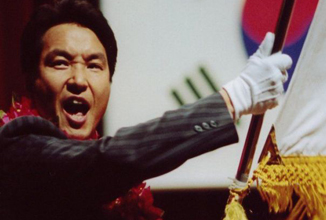 |
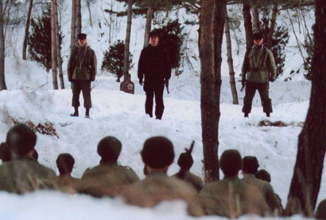 |
Not only that, but the other major narrative thread of Byung-ho and Yun-mi's growing love for each other never really works to any degree. The characters (and actors) have little chemistry together and with the narrative repeatedly moving back to the spy aspects of the story, it's never even shown to any significant degree - save for walks in the park and a tearful scene between them as they finally come to realise the true danger they're in. That really is rather a shame because if their tale of hidden (and almost forbidden) love had been more believable, it would almost certainly have helped to balance out the aforementioned slower paced scenes and added hugely to viewer empathy, not only raising the overall poignancy of proceedings but also underlining the ultimate narrative commentary.
All that said, however, Double Agent does still manage to be engaging throughout, at the very least, and there are in fact several sections where the narrative, visuals and cast performances combine to work like a dream - Byung-ho's escape after exiting Checkpoint Charlie, early on in proceedings; his subsequent interrogation and torture by the South Koreans; and the film's beautiful, poignant and moving conclusion, to name but three - and ultimately the narrative themes and commentary do succeed in getting their points across, despite the aforementioned flaws.
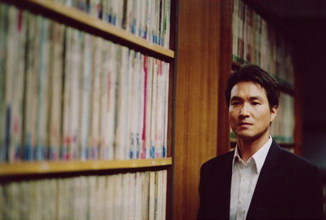 |
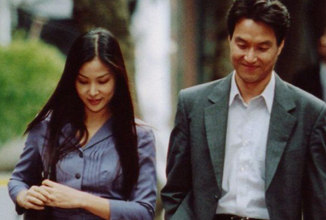 |
Cinematically, Double Agent largely serves its purpose well enough, without being particularly memorable and though it could certainly have benefitted somewhat from the use of more arresting visuals and dynamic camera work, the narrative itself doesn't specifically scream out for anything more than a competent, workman-like job - and that, it is.
Finally, note should also be made of the opening sequence of the film, where CGI is used to place Han Suk-kyu within documentary footage of a North Korean military presentation, while film credits in Russian morph into Korean. A short but superb segment which perfectly sets the scene for the beginning of the film narrative itself.
Cast:
Han Suk-kyu (as Byung-ho) gives a top notch performance throughout Double Agent, as would be expected from an actor of his calibre. However, though his nuanced and polished portrayal stands above any of the others present, the one area in which it cannot help is the love affair between Byung-ho and Yun-mi. As already mentioned, there is next to no chemistry between the two leads, and though Han Suk-kyu does do as much as he can, it's still not enough to make their love believable.
Ko So-young gives a decent enough performance as Yun-mi, but there really isn't enough depth to her character to allow her to spread her wings and take her portrayal to the next level. As such, she is often less memorable (and credible) than Han Suk-kyu in their scenes together and, try as she might, she never quite manages to step out from beneath his shadow.
Cast: Han Suk-kyu, Ko So-young, Cheon Ho-jin, Ryoo Seung-soo
Directed by: Kim Hyeon-Jeong
Summary:
Though flawed, Double Agent resolutely shows that it doesn't need CGI pyrotechnics or secret agent gadgets to be an engaging spy thriller throughout.
DVD
The DVD
edition reviewed here is the Korean (Region 3) Metro DVD Single Disc Edition release which comes in deluxe packaging. The film itself is
provided as an anamorphic transfer with an aspect ratio of 2.35:1 and there are no image artifacts (and no ghosting) present. Image quality remains consistently sharp throughout though there isn't really anything to make the visuals particularly stand out.
The original Korean
language soundtrack is provided as a choice of Dolby Digital 5.1 and Dolby 2.0 and both are clear and well balanced.
Excellent subtitles are provided
throughout the main feature but English-speaking viewers should note that, as with many Korean DVD releases, there are no subtitles available on any of the extras.
DVD
Details:
• Director: Kim Hyeon-jeong
• Format: NTSC,
Anamorphic, Widescreen, Subtitled
• Language: Korean
•
Subtitles: English/Korean
•
Sound: Dolby Digital 5.1/Dolby Digital 2.0
• Region: Region 3
• Aspect Ratio:
2.35:1
• Number of discs: 1
• Classification: 15 (Korean Film Classification)
• Studio:
Metro DVD
• Run Time: 123 minutes (approx.)
DVD Extras:
- Director Audio Commentary
- 'Making of' Featurette
- Interviews (with Director and Musical Director
- Storyboards
- Stills Gallery
- TV Spots
- Theatrical Trailer
|


